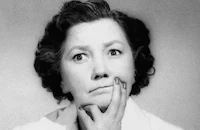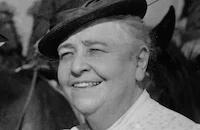Private Number
Cast & Crew
Roy Del Ruth
Robert Taylor
Loretta Young
Basil Rathbone
Patsy Kelly
Joe Lewis
Film Details
Technical Specs

Synopsis
Ellen Neal, a beautiful and upstanding girl of seventeen, arrives at the Winfield home to take a job as a maid, her first foray into the domestic profession. Ellen quickly receives a promotion to Mrs. Winfield's personal maid, and when Dick Winfield arrives home from college, he falls in love with the graceful and charming Ellen. At the family's vacation home in Maine, Dick asks Ellen out on a date, but Ellen refuses on the grounds that the two are not social equals. Dick finally convinces Ellen that her ideas about social class are old-fashioned, and she begins to fall in love with her employers' son. They eventually secretly marry before he departs to finish his senior year at college. Wroxton, the Winfield's manipulative and calculating butler, confesses to Ellen that he is obsessed with her and wants to marry her, but she informs him that she loves another. In revenge, Wroxton, suspecting that his rival is Dick, tells the Winfields that Ellen is pregnant, which he has heard from another maid. The Winfields confront Ellen, who admits that she is pregnant but also that she is married. However, Ellen refuses to divulge the name of her husband, and when Mr. Winfield is about to fire her because he does not believe her story, Ellen's friend Gracie, who is also a servant, reveals that Ellen is married to the Winfields' son. Wroxton then tells the Winfields that Ellen engineered the marriage in order to blackmail them and, to prove his charge, reveals that Ellen has a police record for an arrest that occurred when she was innocently taken to a gambling house by a rakish gentleman named Coakley. The Winfields decide that she is an unfit wife for their son and offer to give her a cash settlement, which she turns down in disgust. Ellen leaves and has her baby, which she cares for in a secluded farmhouse belonging to friends of hers. Wroxton, with Mr. Winfield's consent, intercepts and destroys Ellen's letters to Dick, who, after learning that his parents drove Ellen away, has left them in anger. When detectives come to the farmhouse and bring Ellen a letter, which states that Dick wants to annul the marriage on the grounds of fraud, Gracie convinces Ellen to fight back, if only for the sake of her baby's name. Sam Stapp, Ellen's lawyer, suggests that they seek a countersuit. To establish Ellen as Mrs. Richard Winfield, Stapp sets her up in a fancy Park Avenue apartment and sends the bills to Dick, who has refused to sign the annulment papers. Now that he knows her address, Dick visits Ellen, but when he asks her about the raid, she becomes upset that he doubts her and does not deny his charges. Dick then agrees to sign the annulment papers. At the trial, Coakley lies on the witness stand and says that Ellen propositioned him. After Gracie informs Stapp that Ellen was only seventeen on the night in question, Stapp asks the judge for Coakley's arrest. Fearing a jail sentence, Coakley admits to Dick that Wroxton paid him to lie, and after Dick knocks Wroxton over a table, he gives the courtroom a moving speech in which he requests that the case be dismissed. Dick finds Ellen back at the farmhouse, and after he reiterates his pledge of love, they embrace.

Director

Roy Del Ruth
Cast

Robert Taylor

Loretta Young

Basil Rathbone

Patsy Kelly
Joe Lewis

Marjorie Gateson

Paul Harvey

Jane Darwell
Paul Stanton

John Miljan

Monroe Owsley

Billy Bevan
Frank Dawson

George Irving
May Beatty
Alex Pollard
Jack Pennick
John Van Eyck
Kane Richmond
Lilyan Irene
Maxine Hicks
Betty Morris
Lillian Worth
Ann Howard
Prince
Fred A. Kelsey
Herbert Ashley
Paul Mcvey
Lutra Winslow
Scott Mattraw

Douglas Fowley
Edna Mae Harris
Tom Mcguire
Barbara Dodds
Crew
William Conselman
Ed. Ebele
Raymond Griffith
Wallace Grissell
Eugene Grossman
Roger Heman
Mark-lee Kirk
Thomas Little
Gene Markey
Peverell Marley
Allen Mcneil
Harry Reynolds
William J. Scully
Louis Silvers
Gwen Wakeling
Darryl F. Zanuck

Film Details
Technical Specs

Articles
Private Number on DVD
But it is nonetheless important to evaluate a movie on its own terms, and not unfairly judge it for what it does not even try to be, and in that regard, Private Number is still an entertaining, absorbing, very well acted melodrama, even if it is a bit safe and predictable. Young arrives at the Winfield household looking for work. What she quickly learns, in a very uncomfortable job interview, is that the head butler, played by Basil Rathbone, is a cruel, demented creep who offers her a job as a maid purely because he has the hots for her. Furthermore, he will demand a kickback from her wages. Young gets up, grabs her suitcase, and starts to head outside. When another maid (Patsy Kelly) asks why she's leaving, Young shudders and replies, "I couldn't work here. That butler, he gives me the creeps."
But Kelly convinces her to stay, and eventually the main plot thread comes into focus: while resisting Rathbone's constant advances, Young eventually meets the Winfields' college-age son, played by Robert Taylor, and the two of them fall in love when Young travels with the family to their summer retreat in Maine. The Maine sequence is beautifully romantic and gives the audience what they no doubt want: stunningly photographed (by cameraman Pev Marley) scenes of Robert Taylor and Loretta Young in love with each other on a moonlit lake. Taylor proposes to Young, but Young resists, fearing the social complications of a maid hooking up with her rich employer's son.
Private Number practically unravels in the third act, with developments that are overly preposterous even for a melodrama of the 1930s, an era that was simply crammed with crazy movie plots. Rathbone, insanely jealous, tries to drive the lovers apart, and thanks to his masterful orchestrations, Young is all of a sudden chicly dressed and living in a Park Avenue apartment, making it look to Taylor like she was just a gold digger. And Young falsely believes that Taylor is out to punish her in court. In fact, with all the misunderstandings going on, it's a wonder this movie isn't a screwball comedy.
Director Roy Del Ruth, however, keeps a brisk pace, as per usual in his movies of the era. Young and Taylor look good together in this, their only film together. Taylor was borrowed from MGM for a role that normally might have gone to Fox's own Tyrone Power, who was paired with Young many times. And the supporting cast is excellent, including Patsy Kelly, Joe E. Lewis, Monroe Owsley, Jane Darwell and a dog named Prince (who plays a dog named Hamlet). Prince, in fact, steals all of his respective scenes and turns in a truly great canine performance. But it's Basil Rathbone who ends up stealing the entire movie, and one even wishes he were in it more. Most of his best scenes come early, and he is deliciously evil, steely and arrogant.
Private Number is based on a 1914 play originally called Hush Money, a title that was quickly changed to Common Clay. On Broadway, the lead role was played by Jane Cowl, a renowned stage actress who was also a playwright (Smilin' Through) and who acted in a few Hollywood films. In 1919 the play was turned into a silent feature, Common Clay, starring Fannie Ward. A 1930 remake, also called Common Clay, was produced by Fox, directed by Victor Fleming and starred Constance Bennett.
Private Number looks fine, though hardly pristine, in its new Fox Cinema Archives DVD. Overall, it will please fans of its stars, especially the ethereally beautiful Loretta Young. Her fans will also get a kick out of a breathtaking exchange of "in" dialogue. At one point, Patsy Kelly is describing another character and says to Young: "He's as handsome as Gable -- and Gable ain't bad." To which Young replies, with a smile: "I'll say not!" Clearly this is a jokey reference to the fact that the real Loretta Young and Clark Gable had burned up the screen one year earlier in The Call of the Wild (1935). But the line must have carried added resonance to the film community since it was known around Hollywood that Young and Gable had had an affair on that film, resulting in an illegitimate baby daughter -- an event that would cause Young, a strict Catholic, to feel privately ashamed for the rest of her life. After her death in 2000, Young's authorized biography officially revealed the truth to the world.
Fox Cinema Archives has also just released several more classic titles from the era, including the terrific Me and My Gal (1932), starring Spencer Tracy and Joan Bennett and directed by Raoul Walsh, the tuneful Sweet and Low-Down (1940), featuring Linda Darnell and some stellar numbers by Benny Goodman, and Four Sons (1944), a war drama starring Don Ameche and a remake of the silent John Ford film of the same title.
By Jeremy Arnold

Private Number on DVD
Quotes
Trivia
Notes
The working title of this film was Confessions of a Servant Girl. The play Common Clay was originally copyrighted in 1914 under the title Hush Money. A book based on the play was published in 1916. Variety noted that the story was billed as having been adapted from a play by Cleves Kinkead without specifically mentioning Common Clay. A Hollywood Reporter news item in January 1936 stated that Gene Markey was working from a story by Wilson Collison and from the play Servant Girl by Kinkead, and that play is listed as the source of the film in the Hollywood Reporter production chart, but no information about the play or Collison's story has been found. According to information in the Twentieth Century-Fox Records of the Legal Department at the UCLA Theater Arts Library, the studio owned the silent motion picture rights to Common Clay, having produced an earlier film based on the play, and before Private Number was made, they acquired the sound rights. Variety commented that many of the film's characters are not in the original play. This was the first feature film of comedian Joe Lewis, better known as Joe E. Lewis. According to the legal records, Joseph Tozer was originally cast as "Frederick," but he was replaced by Billy Bevan, and Hale Hamilton was originally cast as "Perry Winfield," but he was not feeling well after a rehearsal and was replaced by Paul Harvey. Information in the legal records states that some scenes were shot at the pier in Venice, CA and that in early April 1936, a second unit and process crew was waiting until snow cleared at Lake Arrowhead, CA before they commenced filming long shots and plates. In 1919, Pathé released a film based on the same source, entitled Common Clay, produced by Astra Film Corp., directed by George Fitzmaurice, and starring Fannie Ward (see AFI Catalog of Feature Films, 1911-20; F1.0765); in 1930, Fox produced an English-language film based on the same source, also entitled Common Clay, directed by Victor Fleming and starring Constance Bennett (see AFI Catalog of Feature Films, 1921-30; F2.0986) and a Spanish-language film entitled Del mismo Barro, directed by David Howard and starring Mona Maris.














